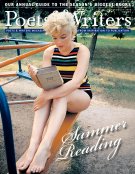A public figure like Henry Bonwiller would never dare admit his flaws, but Canin, who is notoriously thin-skinned and intermittently suffers from low-level depression, is the first to admit his own. Canin did little writing as a student at Iowa in the mid-eighties—he still squirms a bit as he tells an anecdote about finding himself at the front of an auditorium with three other students and visiting author John Irving, who was to analyze their manuscripts for an audience of their peers. "Only two of these stories are publishable, so I'll just talk about them," Irving announced, shuffling Canin's story to the bottom of the pile.
In any case, Canin's deep ambivalence about a career in writing may stem from his bewildering multitude of talents, each clamoring for his attention. "I used to call him pathologically well rounded, because he was good at so many things: writing, doctoring, carpentry, plumbing, softball," says an old friend from San Francisco, nonfiction writer Ethan Watters. "If he wasn't such a nice guy, I'd really not like him."
The other major issue for Canin was that writing never seemed like a practical profession. "I remember we went to a poetry reading and he said, ‘I think everybody should go out and get a job,' which was very telling," deNiord says. "He'd just gotten into Harvard Medical School and felt, ‘Now I'm going to do something with my life.' Writing wasn't really working out for him—it seemed like an indulgence, a dilettantish thing to him—and he had a newfound purpose in going off to med school. I really thought he was going to leave writing behind completely at that point."
But it was during medical school, ironically, when Canin began writing in earnest, producing most of the precociously wise short stories that would be collected in Emperor of the Air. The book was a rousing success, both critically and commercially—it was one of the last short fiction debuts to launch a serious assault on the best-seller lists—but Canin continued to waffle between medicine and literature. It was only after he was well into his residency in San Francisco that he finally committed himself exclusively to writing.
But this decision amounted to a self-consignment to hell for Canin, a perfectionist whose literary standards were impossibly high. The novelist and nonfiction writer Po Bronson—with whom Canin and Watters in 1994 established the Grotto, a suite of writers workspaces in San Francisco—recalls his friend's agony. "That pained look on his face was a daily occurrence," Bronson says. "He'd be getting three hundred words a day while I was getting two thousand words a day. He'd write three pages and rip two out. We'd be zipping right along with our stuff, and he'd laugh and shake his head at us. Of course, the reality is that he'd seen great heights that we'd never seen and was holding himself to a different measure."
The level of difficulty in
Canin's work only increased as he transitioned from writing mostly short
stories to writing novels, a process whose first fruit was Blue River (Houghton Mifflin, 1991), the story of two
brothers, one an ophthalmologist, the other a bum. The celebrated title story
of The
Palace Thief was nearly novella
length, and the three books that have
followed—For Kings and
Planets, Carry Me Across the Water,
and now America
America—have steadily increased
in complexity and length. "I want to do the hard thing," he says. "Someone said writing a novel is like walking from
Vladivostok to Gibraltar on your knees. That's the way I feel about it."
America America has been the longest walk of all. Canin started writing it in 2000, as the story of a teacher and his student, only to realize he was reprising The Palace Thief. Then came the terrorist attacks of September 11, 2001, after which Canin stopped writing altogether for nearly two years. "It seemed silly to write another novel—and it still to some degree seems silly to me, writing fiction—but in the end, it just made me more serious," he says. "It made me think about politics, made me turn to the external world a lot more."
This turning outward is a trend Canin sees among his students at Iowa. "Not to be too grandiose, but because I teach, I see American literature about five years ahead," he says. "In the last decade, two things happened that are bringing about a real shift. One is the Internet, which makes research so much easier; a lot of students are writing about historical events, for example, because they have such easy online access. The other thing that happened is September 11. It's made people realize that there are larger forces out there to think about."
There are larger forces, to be sure, many of which Canin ponders nearly every day as presidential campaign issues and as fodder for fiction: the health care crisis, the persistence of poverty, the opportunities and challenges of globalization. But another force, equally large in Canin's life as a writer, is the question of whether he can continue to write at all.









